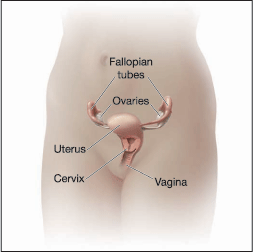Cervical Cancer Can Be Prevented
Basic Facts About Cervical Cancer
What Causes Cervical Cancer?
About the Pap Test
When Should I Have a Pap Test?
Where Can I Get a Pap Test?
How Do I Pay for a Pap Test?
For More Information
Cervical Cancer Can Be Prevented
Did you know that there is a simple test your doctor can do
that can help prevent cervical cancer? It is called the Pap test.
This test can help you stay healthy so you can be there for
your family.
- The Pap test can find early cell changes
in the cervix before these changes turn
into cancer.
- If the test finds cell changes early
enough, it can prevent you from
having cervical cancer.
Having a Pap test once is not enough!
- Women and teenagers should start
getting regular Pap tests about 3 years
after the first time they have sex.
- Women should have a Pap test no
later than age 21, even if they have
not started having sex.
- Women should get a Pap test at least
once every 3 years.

|
Doctor Vargas: "Many
women do not know
about the Pap test.
Then they find out they
have cervical cancer
when it is at an
advanced stage. The
cancer could have been
prevented with regular
Pap tests."
|
This booklet can answer some questions about cervical cancer
and may ease your concerns about having the Pap test. This booklet talks about:
- Cervical cancer
- The Pap test (sometimes called a Pap smear)
- How often to get a Pap test
- Common questions and answers.
You will read about 3 women. They may be like you or other
women you know. Consuelo, Rosa, and Virginia have a lot of
questions about the Pap test. Read their questions and
answers in this booklet.
Basic Facts About Cervical Cancer
The picture below shows a woman's reproductive organs.
- The cervix is the lowest part of the uterus. It forms an
opening between the uterus and the vagina.
- The uterus, or womb, is where the baby grows when a
woman is pregnant.

- Sometimes cells in a woman's cervix begin to grow in an
abnormal and disorganized way.
- These abnormal cells may not be cancer yet. Without
treatment, they can become cancer.
- Most of the abnormal changes in the cells of the cervix do
not cause any symptoms in the beginning. That is why it
is important to get a Pap test. It will help to see if there
are any early changes in the cells.
- A "negative" test result means that no cell changes were
found. A "positive" result means that there might be cell
changes.
- If there are changes, your doctor will treat them before
they turn into cancer cells. With the help of your doctor,
you can prevent cervical cancer.

|
Consuelo:
I take care of
myself and I feel great. Why
do I need a Pap test?
|
 Doctor Vargas:
"Although
you may feel
healthy, the
abnormal changes that can
end up as cancer can
appear without any
symptoms. This can
happen even when you are
feeling great. That is why it
is important to get regular
Pap tests."
Doctor Vargas:
"Although
you may feel
healthy, the
abnormal changes that can
end up as cancer can
appear without any
symptoms. This can
happen even when you are
feeling great. That is why it
is important to get regular
Pap tests."
|
What Causes Cervical Cancer?
The main cause for cervical cancer is a virus. It is called
HPV. This stands for human papillomavirus (pronounced
pap-ih-LO-ma-VYE-rus).
- HPV is a virus spread through sexual contact.
- You can be infected with HPV and not know it. You will
not feel the virus or see it. Usually there are no symptoms.
- Most HPV infections go away on their own. But some
may not. The infections that do not go away can lead to
cell changes in the cervix. These cell changes can lead to
cervical cancer.
- The Pap test can often find changes caused by HPV
before they lead to cervical cancer.
| HPV can be transmitted through sexual contact, even
when a condom is used. |
 Doctor Vargas: "Some women wonder if they can
get HPV through forms of intimate contact other
than vaginal sex. The answer is yes. HPV can be
spread through vaginal and anal intercourse; finger
to genital contact; and finger to anal contact."
Doctor Vargas: "Some women wonder if they can
get HPV through forms of intimate contact other
than vaginal sex. The answer is yes. HPV can be
spread through vaginal and anal intercourse; finger
to genital contact; and finger to anal contact."
|
Depending on the results of your Pap test, your doctor may
do an HPV test. It is important to follow up with your
doctor on all test results.

|
Rosa: I have only had sex
with one person. Do I have to
get a Pap test?
|
 Doctor Vargas:
Yes. Women
should get
regular Pap tests
even if they
have had only one partner.
HPV is a very common
virus. Someone could have it
and not know it.
Doctor Vargas:
Yes. Women
should get
regular Pap tests
even if they
have had only one partner.
HPV is a very common
virus. Someone could have it
and not know it.
|
About the Pap Test
- The Pap test is simple, fast, and routine.
- The Pap test is the best way to find abnormal cell changes
in the cervix. It can find them early, before they turn into
cancer.
- The Pap test is normally done at the same time as a
pelvic exam.
What is a pelvic exam?
In a pelvic exam, the doctor checks the reproductive organs to
see if the size and shape are normal.
This exam is not the same as the Pap test, but it is often done
during the same visit. This exam only takes a few minutes. It is
important for good health.
|
- The Pap test does not check for HPV. It only checks for
cell changes that could become cancer.
- The Pap test does not cause cancer. It also does not prevent
pregnancy.
- The Pap test does not detect sexually transmitted diseases
(STDs). Ask your doctor if you want tests for these.
- Either a female doctor or female nurse will be with you
during the test. For your comfort, your legs will be covered
with a sheet.
- Your doctor will take cells from the cervix. Your doctor will
use a clean instrument called a "speculum" to see the
cervix. Your doctor will use a swab or a small brush to get
some cells.
 Doctor Vargas: "It is normal to feel nervous. But it
is helpful to try to relax as much as possible. You
might feel slight discomfort, pressure, or have light
bleeding. If you feel uncomfortable, tell the doctor
immediately."
Doctor Vargas: "It is normal to feel nervous. But it
is helpful to try to relax as much as possible. You
might feel slight discomfort, pressure, or have light
bleeding. If you feel uncomfortable, tell the doctor
immediately."
|
- Your doctor sends the cells to the lab.
- The results come back to your doctor in 1 or 2 weeks.
- If the test results are normal ("negative"), they may not
notify you at all. In that case, you should call to be sure
that the results are normal.
- If there is something abnormal on the test ("positive"), your
doctor should tell you. Then, you should return to see your
doctor.
- Most times, an abnormal ("positive") test does not mean
that you have cancer. It only means that your doctor needs
to do more tests.

|
Virginia:
After a Pap test, is a
woman still a virgin?
|
 Nurse Vivian: "Many women
who have not had
sex yet want to
know if they are
still virgins after
having a Pap test. The Pap test
can be done without affecting
virginity. To lessen the
discomfort, you can ask your
doctor to use the smallest
speculum."
Nurse Vivian: "Many women
who have not had
sex yet want to
know if they are
still virgins after
having a Pap test. The Pap test
can be done without affecting
virginity. To lessen the
discomfort, you can ask your
doctor to use the smallest
speculum."
|
- A Pap test does not cause cancer, does not prevent
pregnancy and does not test for STDs.
- Some products may wash away or hide abnormal cells.
Unless instructed by your doctor, for 2 days before a Pap
test, do not:
- Douche
- Use any vaginal medicines
- Put spermicidal foams, creams, or jellies in
your vagina.
- Do not have sexual intercourse for 1 to 2 days before your
Pap test. This may cause unclear results.
- After the test, you can go back to your normal activities and
return to work right away.
- If you get your period on the day of the test, call your
doctor right away to make another appointment. Make the
appointment for when you are not having your period.

|
Rosa:
I often feel embarrassed to
talk about my body and other private
issues.
|
 Nurse Vivian:
"Because
of our culture, we are
not used to talking
about sex and intimate
parts of the body. But
remember, your doctor
is used to discussing these sensitive
issues every day and wants to help
you. Even if you feel embarrassed,
remember that this test is important
for your health."
Nurse Vivian:
"Because
of our culture, we are
not used to talking
about sex and intimate
parts of the body. But
remember, your doctor
is used to discussing these sensitive
issues every day and wants to help
you. Even if you feel embarrassed,
remember that this test is important
for your health."
|
When Should I Have a Pap Test?
- About 3 years after beginning to have sex
- No later than age 21, even if you are not having sex.
- At least once every 3 years. Depending on the results, your
doctor may suggest getting tested more often than that.
- If you are 65 years old or older, talk to your doctor about
whether or not you should keep having Pap tests. Your
doctor will tell you how often you should get one. This
will depend on the results of your previous tests.
- If you had a "total hysterectomy" (pronounced hiss-ter-
EK-toe-mee), you do not need a Pap test. However, you
should have the Pap test if the surgery was done to treat
pre-cancer.
| A total hysterectomy is the removal of both the uterus and
cervix. Some women may not know what type of hysterectomy
they had. If you are not sure, talk to your doctor to find out if
you still need a Pap test. |

|
Consuelo:
My
husband died 15 years
ago. Do I still have to get
a Pap test?
|
 Doctor Vargas: "Yes,
because you can have
cervical cancer even if
you are not currently
having sex."
Doctor Vargas: "Yes,
because you can have
cervical cancer even if
you are not currently
having sex."
|

|
Consuelo: I am a
grandmother. I do not get my
period anymore. Do I have to get
a Pap test anyway?
|
 Nurse Vivian: "Yes,
because cervical
cancer can appear
after menopause."
Nurse Vivian: "Yes,
because cervical
cancer can appear
after menopause."
|
Where Can I Get a Pap Test?
- Doctor's office
- Clinic or community health center
- Your local health department.

|
Virginia:
I do not get Pap tests because I do not have
insurance.
|
|
Angela, her friend: "Even though you do not have health
insurance, you may be able to get a free or low-cost test."
|
How Do I Pay for a Pap Test?
- Free and low-cost tests: If you do not have health
insurance, there may be places in your community where
you can get a Pap test for free. People with a low income
or without health insurance may be able to go to a clinic
to have the test done. For more information on where to
get a free or low-cost Pap test, call toll-free
1-800-4-CANCER (1-800-422-6237). It is possible to
speak to a representative in English or Spanish.
- Insurance coverage: If you have health insurance, it
will usually pay for the Pap test. Some companies have
their own rules regarding the test. If you have questions
about coverage, talk to your insurance company.
- Medicaid: If you are eligible for Medicaid, you might
not have to pay for the doctor visit and the Pap test. For
more information, call the nearest Medicaid office.
- Medicare: If you are 65 years of age or older, Medicare
pays for the Pap test every 2 years, or every year for certain
women at higher risk. For more information about
coverage for the Pap test by Medicare, call toll-free
1-800-MEDICARE (1-800-633-4227). It is possible to
speak to a representative in English or Spanish.
 |
For More Information
It is easy to get free information about cervical cancer or other
types of cancer.
- By phone: Call toll-free 1-800-4-CANCER
(1-800-422-6237)
There are instructions to hear information in English or
Spanish. You can also talk with a representative in English or
Spanish.
- On the Internet: Visit www.cancer.gov
Information is available to read or print in English or Spanish
(click on "Español").

|
Rosa:
My mom does not speak English. How can she get help in
Spanish?
|
|
Receptionist: " "If you help her make the appointment, let the
office know that she needs an interpreter. She can also ask that
the results of the test be sent in Spanish. Or ask that an
interpreter call to give her the results."
|
|